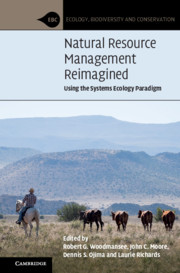Book contents
- Natural Resource Management Reimagined
- Ecology, Biodiversity and Conservation
- Natural Resource Management Reimagined
- Copyright page
- Contents
- Contributors
- Preface
- 1 The Systems Ecology Paradigm
- 2 Environmental and Natural Resource Challenges in the Twenty-First Century
- 3 Evolution of Ecosystem Science to Advance Science and Society in the Twenty-First Century
- 4 Five Decades of Modeling Supporting the Systems Ecology Paradigm
- 5 Advances in Technology Supporting the Systems Ecology Paradigm
- 6 Emergence of Cross-Scale Structural and Functional Processes in Ecosystem Science
- 7 Evolution of the Systems Ecology Paradigm in Managing Ecosystems
- 8 Land/Atmosphere/Water Interactions
- 9 Humans in Ecosystems
- 10 A Systems Ecology Approach for Community-Based Decision Making
- 11 Environmental Literacy
- 12 Organizational and Administrative Challenges and Innovations
- 13 Where to From Here? Unraveling Wicked Problems
- Index
- References
2 - Environmental and Natural Resource Challenges in the Twenty-First Century
Published online by Cambridge University Press: 25 February 2021
- Natural Resource Management Reimagined
- Ecology, Biodiversity and Conservation
- Natural Resource Management Reimagined
- Copyright page
- Contents
- Contributors
- Preface
- 1 The Systems Ecology Paradigm
- 2 Environmental and Natural Resource Challenges in the Twenty-First Century
- 3 Evolution of Ecosystem Science to Advance Science and Society in the Twenty-First Century
- 4 Five Decades of Modeling Supporting the Systems Ecology Paradigm
- 5 Advances in Technology Supporting the Systems Ecology Paradigm
- 6 Emergence of Cross-Scale Structural and Functional Processes in Ecosystem Science
- 7 Evolution of the Systems Ecology Paradigm in Managing Ecosystems
- 8 Land/Atmosphere/Water Interactions
- 9 Humans in Ecosystems
- 10 A Systems Ecology Approach for Community-Based Decision Making
- 11 Environmental Literacy
- 12 Organizational and Administrative Challenges and Innovations
- 13 Where to From Here? Unraveling Wicked Problems
- Index
- References
Summary
National and international agencies and organizations have published reports outlining critical natural resource, environmental, and societal challenges facing global inhabitants. These reports include the UN Sustainability Goals, Future Earth, Global Land Project, and the Resilience Alliance. Recognizing many of the topics listed in these reports are broad and aspirational, the authors of this chapter have disaggregated many topics into research and management challenges for which the systems ecology paradigm is well suited. Disaggregation is based on challenges at different spatial hierarchical scales: organisms/populations; ecological sites; landscapes; small regions/watersheds; regions/nations; continents; and the globe. Emphasis is placed on research needs at landscape and larger hierarchical levels. Biophysical knowledge acquired during the past 50 years about organism/population and ecological site levels is available now to better manage ecosystems and natural resources. However, research blending the ecosystem knowledge base with behavioral, learning, organizational, and marketing sciences is vitally needed to affect management practice change at scales where people manage land and waters. The goal is to engage managers, policy makers, thought leaders, and concerned citizens to resolve critical problems and adopt best management practices to meet current and future environmental challenges (e.g., provision of ecosystem services and climate change effects on ecosystem).
Keywords
- Type
- Chapter
- Information
- Natural Resource Management ReimaginedUsing the Systems Ecology Paradigm, pp. 36 - 65Publisher: Cambridge University PressPrint publication year: 2021

